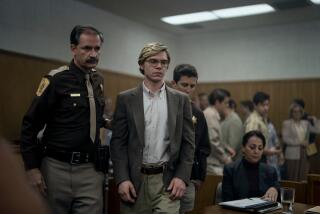New world order
ON a Monday, a hideously mutilated corpse is discovered in a dumpster in Seville -- scalped, features erased by acid, hands amputated in an effort to render the body unidentifiable. Early the next morning, a bomb explodes in a basement mosque in an apartment complex, bringing part of the structure down and causing a grievous loss of life, particularly in a preschool on the ground floor. Any devout reader of thrillers knows that these events are not unrelated. That’s especially true of Robert Wilson, whose specialty is long, sober novels that make surprising connections between disparate groups and individuals, often over long periods of time.
Essentially, as readers of his good and bestselling “A Small Death in Lisbon” know, Wilson writes heavily detailed police procedurals set in a somewhat surprising place -- the Iberian Peninsula. But come to think of it, why not there? Obviously there are police in Spain and Portugal, and they must have procedures too. Such stories begin with the rigorous application of reason to chaos. As chief homicide inspector Javier Falcon puts it in Wilson’s latest novel, “The Hidden Assassins”: “You have to agree that there has been a breakdown of the logic of the scenario, and it’s my job to create different lines of enquiry to find the necessary logic to resolve it.” With the expenditure of a good deal of shoe leather and cat-and-mouse dialogues (occasionally tedious) with witnesses, Falcon wraps up the matter in less than a week.
But Wilson likes to weave a certain amount of his principal characters’ often dark personal histories into his stories, which means his novels are never models of narrative efficiency. Sometimes, these subplots resonate interestingly with the main one; sometimes, they are underdeveloped distractions. There is also -- fair warning here -- an ugly streak in Wilson that may be off-putting to some readers. This includes the brutal beating (and eventual murder) of Falcon’s former wife by an otherwise smooth and worldly prosecutor -- a crime that adds nothing to the major issues Wilson wants to address.
Yes, issues. For Wilson is nothing if not ambitious. What’s going on in Seville, as it swelters under an early-summer heat wave, is a deadly confrontation between two forms of religious fundamentalism. Yes, the mosque harbors Al Qaeda-like terrorists, who are using it to store a large quantity of hexogen, a hugely volatile explosive, intended for an assault on London’s financial center. But it is also the target of counter-terrorists representing a right-wing Catholic organization who want to make their own deadly statement. They don’t mean to take out the apartment complex. But they’re also unaware of the cache of hexogen, which their smaller bomb triggers.
What we have here, of course, is a case of ignorant armies clashing by night, with the rationalist Falcon caught in the middle and trying, as well, to keep memories of a painful past from interfering with his attempt to solve the case. His story also provides Wilson with the opportunity to reflect, quite intelligently, on the new world the terrorists are creating. For example, one of his Arab characters muses about the way Americans and Islamists view the past: “In becoming an American, part of the pact is to walk away from your past, your history and totally embrace the future, progress and the American Way. Whereas, to an Arab, what happened in the seventh century or 1917 is still as vivid today as it was when it first occurred. They want us to embrace a new future, but we cannot forsake our history.” That’s a very interesting point: How do you deal with people who refuse to clear their in-boxes? Conversely, how do they deal with people bustling forward without reference to past mistakes and injustices?
Wilson is bitterly aware of the ironies in this situation. He has this same Arab character remark, “Terrorists are acceptable once they’ve become strong enough to be perceived as freedom fighters. When they are weak and disenfranchised, they are just common bloody murderers.”
This remark contains a hard truth. We routinely do business with regimes whose early histories are drenched in blood. Later, this same figure notes: “You know, Muslim life is regarded rather cheaply in the West. Think how valuable each of the 3,000 lives was in the Twin Towers, how much was invested in the 191 commuters in Madrid or the 50-odd people who died in the London bombings, and then look at the value of the 100,000 Iraqi civilians who lost their lives in the pre-invasion assault.”
Not entirely original thoughts but ones that perhaps flicker occasionally in the recesses of Western minds. But they take on a particular vividness in the context of an entertainment like “The Hidden Assassins.” They interrupt the smooth flow of fantasy and jar us into alertness in a way, perhaps, that such ideas would not were they found where expected: in analytically serious works of nonfiction. I would have been happy to have had more of them from Wilson.
And perhaps less of the sometimes plodding investigative activities of Falcon and his team of detectives. We need, as well, either more or less of Wilson’s subplotting. He needs to develop this material more fully or else forget it entirely. I’m thinking in particular about a mysterious, religion-driven corporation that has real paranoid possibilities but whose role peters out inconclusively. There’s also a haunted former lover of Falcon’s whose troubles, though interesting, are not well integrated into the novel. You think: In for a penny, in for a pound. In a 454-page novel, what’s another 50 pages among friends? But you also think: I’m already doing an awful lot of reading just to follow a detective story.
That said, “The Hidden Assassins” represents a growing trend. We all know that one of the minor consequences of the Cold War’s demise was to rob thrillerdom of its great us-against-them topic. But the genre’s better practitioners are beginning to embrace the possibilities of the terrorist threat -- Daniel Silva’s efforts are highly enjoyable -- and it is novelistically promising, because the bad guys are not so monolithically managed. The terrorists are erratic, at least half-mad and bureaucratically untethered. The kind of dark doubling that went on between George Smiley and Karla, his Soviet counterpart, is not going to happen in this revised secret world, which still awaits its John le Carre. Or perhaps even its Joseph Conrad. I don’t think Robert Wilson is that writer, but he’ll keep you agreeably occupied until the right one comes along. *
More to Read
Sign up for our Book Club newsletter
Get the latest news, events and more from the Los Angeles Times Book Club, and help us get L.A. reading and talking.
You may occasionally receive promotional content from the Los Angeles Times.








